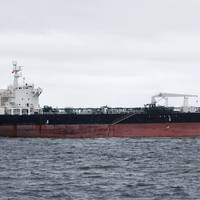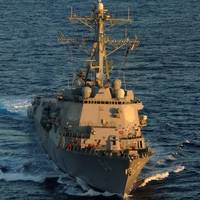Saudi Arabia Urges Improved Maritime Security in Gulf

Saudi Arabia wants enhanced maritime security in the crucial Gulf region as part of its rapprochement with long-timerival Iran, Foreign Minister Prince Faisal bin Farhan said on Saturday.Iran and Saudi Arabia agreed in March, in a deal brokered by China, to end a diplomatic rift and reestablish relations following years of hostility that had endangered regional stability including in the Gulf, Yemen, Syria and Lebanon."I would like to refer to the importance of cooperation between the two countries on regional security, especially the security of maritime navigation...
Iran Vessels Make 'High Speed Intercept' of US Ship

Four of Iran's Islamic Revolutionary Guard Corps (IRGC) vessels "harassed" a U.S. warship on Tuesday near the Strait of Hormuz, a U.S. defense official said, amid Washington's concerns about Iran's posture in the Gulf and in the Syrian civil war. The vessels harassed the destroyer by "conducting a high speed intercept and closing within a short distance of Nitze, despite repeated warnings," the official said. IRGC, the Islamic Republic's praetorian guard, is suspicious of U.S.
Saudi-Iran Standoff and Oil Tankers
The Saudi-Iran standoff is certainly one to worry over given its ramifications for oil supply as they sit on either side of the Persian Gulf, the world’s biggest concentration of oil tankers, reports Bloomberg. The Strait of Hormuz at the mouth of the Persian Gulf is the world’s most important choke point for oil shipments, with about 17 million barrels of crude passing through daily. World chokepoints for maritime transit of oil are a critical part of global energy security. About 63% of the world's oil production moves on maritime routes. The Strait of Hormuz and the Strait of Malacca are the world's most important strategic chokepoints by volume of oil transit.
Saudi-led Coalition Bombs Yemen's Hodeidah Port
The Yemen's Red Sea port of Hodeida was seriously damaged and closed after the airstrikes of the Arab Coalition against Houthi, reports Reuters. Warplanes from a Saudi-led coalition hit Yemen's Red Sea port of Hodeidah. The raids destroyed cranes and warehouses in the main entry point for aid supplies to the north of the country. Hodeida, controlled by Iranian-allied Houthi forces, has become a focal point of efforts to resupply the impoverished Arab state, battered by five months of war that has killed over 4,300 people. The port is main import hub for aid supplies to the country’s north, but most of the warehouses with humanitarian aid delivered by the United Nations were also completely damaged and burning.
Iranian Ships Fire Shots at Singapore Tanker In The Persian Gulf
Iranian patrol boats opened fire on a Singapore-flagged oil tanker as it moved through the Strait of Hormuz in a confrontation, reports Reuters. The Alpine Eternity, a ship flagged to Singapore, fled toward the shore of the United Arab Emirates, said the official who spoke on condition of anonymity because he was not authorized to speak publicly. Nobody was injured. The Alpine Eternity issued a radio call for help and the Iranian boats fired a second wave of warning shots, the officials said. The incident reflects rising tensions in the Gulf, fuelled in part by the conflict in Yemen that pits Iranian-backed Shiite rebels against pro-government forces supported by a Saudi-led coalition of Sunni Arab states. There were no U.S. personnel on the vessel, according to CNN.
Iranian Ships Turn Away from Yemen
An Iranian convoy, believed to be carrying weapons destined for the Houthi rebels in Yemen, turned around and is headed north towards home country, WSJ quoted as U.S. defense officials saying. The cargo ships, accompanied by two Iranian warships, shifted course as a U.S. aircraft carrier moved within 200 nautical miles of the flotilla. The flotilla of nine slow-moving Iranian cargo vessels was in the area of the Arabian Sea and the Gulf of Aden, south of Oman and still east of the Yemeni border, says another report in Reuters. The Iranian ships, which had been moving slowly toward Yemen's capital of Aden, are no longer steaming in that direction, Army Col. Steve Warren, a Pentagon spokesman, told reporters Thursday.
U.S. Navy Warship Steams Toward Yemen
The United States Navy is prepared to intercept Iranian ships in Yemeni waters using the USS Theodore Roosevelt and other ships, reports the AP. According to this report, the Iranian ships are believed to be transporting weapons to the Houthi rebel group in Yemen. There are nine U.S. ships in total in the area. The deployment brings to nine the number of U.S. warships in the area. The Iranian convoy is comprised of nine ships, including two patrol boats, a senior U.S. defense official reportedly told AFP, saying its exact destination was unknown. However, Pentagon spokesman Colonel Steven Warren denied reports the U.S. warships have orders to intercept the Iranian vessels. Navy officials said Monday that the Roosevelt was moving through the Arabian Sea.
Islamic State Takes Control of Oil Field & Dam in Iraq
Fighters of the Islamic State militia took control Sunday of the largest dam in Iraq, a reservoir of oil and three cities after breaking the biggest defeat the Kurdish forces since they began operations in the region in June. Capturing the Mosul dam after just 24 hours' offense could give the Sunni militiamen ability to flood the big cities, as part of its campaign to topple the Shiite government of Prime Minister Nuri al-Maliki. The Islamic State, which considers the Shiite majority in Iraq as apostates who deserve death, also captured the site of Ain Zalah, adding four others who are already under their control, and three cities. The insurgents met with strong Kurdish resistance only at the beginning of his latest offensive, when they took the city of Zumar.





